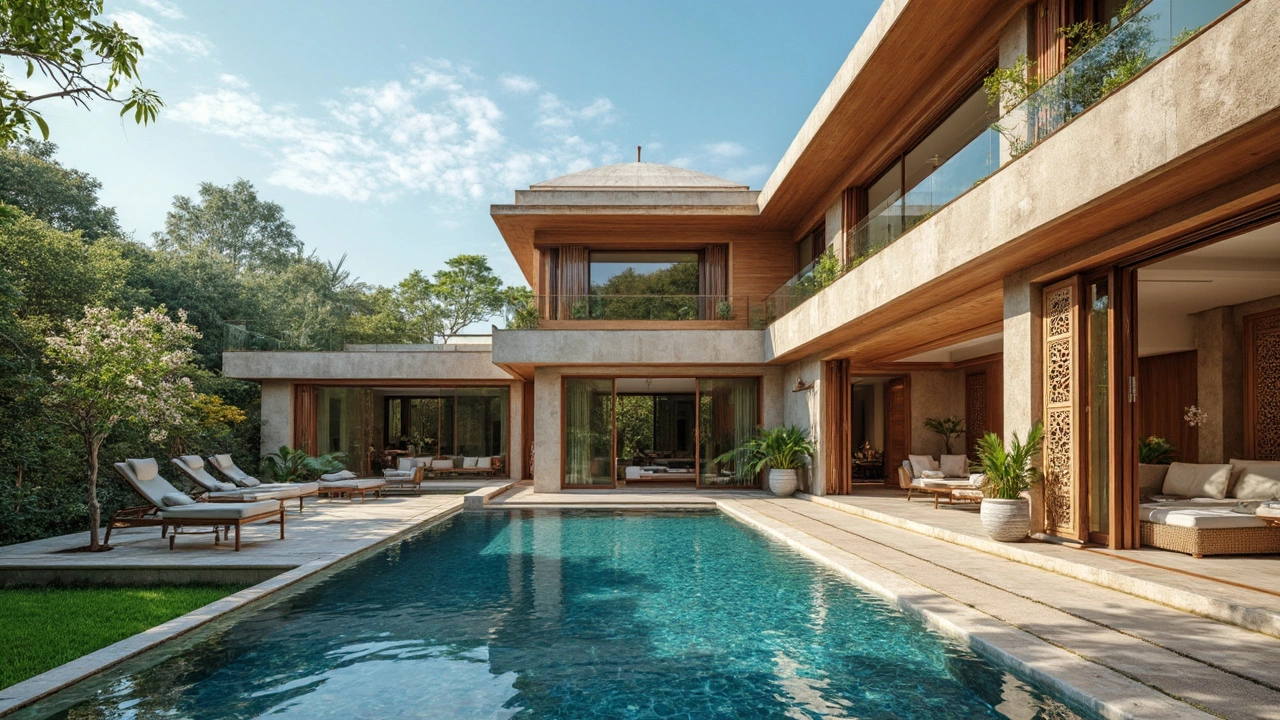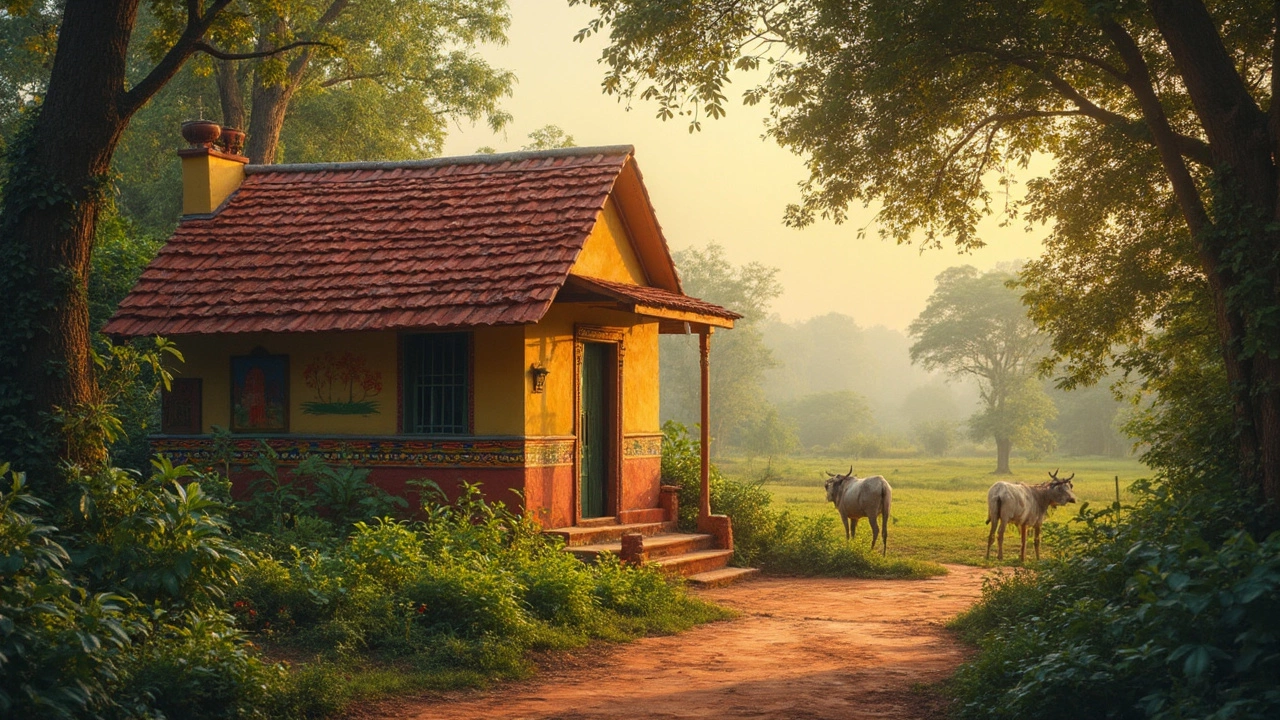When you hear 'cottage' or 'villa,' what comes to mind? Maybe cozy weekend retreats or luxurious homes with panoramic views. But which one is actually bigger? It's a common question, especially if you're eyeing properties for sale. Let's take a closer look at what separates a cottage from a villa.
Typically, cottages are smaller, charming homes that often have a rustic feel. They're like the snug sweater of houses. Villages tend to be out in the countryside or near the beach. They might not have loads of square footage, but they make up for it with charm and character.
On the flip side, villas usually mean more space. These houses are the roomy sweatshirts—comfortable but expansive. A villa might offer ample living space, perfect for families or social butterflies who love hosting get-togethers. Often found in suburban areas or as part of a resort, villas can be quite sprawling.
- Defining Cottages and Villas
- Size Matters: Square Footage
- Architectural Styles
- Purpose and Functionality
- Location and Environment
- Choosing What's Right for You
Defining Cottages and Villas
Understanding the difference between a cottage and a villa can help you recognize what you're getting into when house hunting. Each type of property has distinct features and serves varied lifestyles.
Cottages
Cottages are typically smaller homes, known for their cozy vibe and rustic appeal. Imagine a storybook house nestled in the woods or perched near a serene lake. They usually have a simple layout, often a single story, although some have lofts.
Dating back to medieval times, cottages originally housed farm workers in England. Nowadays, they still hold that picturesque, quaint charm. Folks often look for cottages as vacation homes where they can unwind.
Villas
On the other hand, villas scream luxury and space. These homes often come with large rooms, sprawling lawns, and even leisure facilities like pools or tennis courts. They're typically found in affluent areas or resort settings.
Historically, villas served as country homes for the elite in the Roman Empire. Today, they maintain that upscale feel, providing a combination of comfort and extravagance. They are ideal if you're keen on hosting parties or need room for a growing family.
Key Differences
- Size: Cottages are generally smaller than villas, both in square footage and overall footprint.
- Style: Cottages have a cozy, traditional look; villas tend to be modern and spacious.
- Purpose: Cottages often serve as weekend getaways, while villas are usually primary residences.
When choosing between a cottage and a villa, it's all about your lifestyle needs and personal preferences. Whether you're drawn to the quaintness of a cottage or the luxurious spread of a villa, each offers a unique living experience.
Size Matters: Square Footage
When it comes to the battle of size between a cottage and a villa, square footage is a key player. Generally speaking, villas are often the larger option, boasting sprawling spaces that can accommodate large families or folks who love hosting a crowd. Villas tend to offer several bedrooms, spacious living areas, and sometimes even their own gardens or pools. You might find yourself exploring up to 3,000 square feet or more in some cases.
"While cottages foster an intimate, cozy ambiance, villas provide the luxury of space, offering extensive layouts and elegant design," says architecture expert, Anne Roberts.
In contrast, cottages are generally more modest in size. Think of them as the compact and efficient choice. A cottage usually covers around 1,000 to 1,500 square feet, focusing on charm and practicality. Their size makes them great for weekend getaways or as a serene retreat from city life.
Comparing Spaces
One way to decide what's best for you is to consider the purpose of the home. Are you looking for a peaceful sanctuary or an active hub? Look at your lifestyle and what you need in a home.
In some regions, these terms might blur a little. For example, in a resort setting, a 'cottage' could be more like what some folks might label a villa elsewhere. That's why it's crucial to check those floor plans!
Consider Local Definitions
Remember, local customs and definitions can vary, so a villa in one place might not be the same size as a villa elsewhere. Before jumping to any conclusions, always read the fine print and maybe even talk to a local expert on the matter. Who knew learning the square footage of what you're buying could be so important?
Architectural Styles
So, let's chat about architectural styles when it comes to a cottage and a villa. You might be surprised by how diverse these styles can get. Even if each type has typical features, architects add their own flair, making new builds unique.
Cottage Architecture
Cottages are usually known for their cozy, quaint vibes. Think charming brickwork, thatched roofs, and wooden shutters. These are the classic fairy-tale images. English and Cape Cod styles are quite popular. You might find steep rooflines and small-paned windows, giving cottages a timeless appeal. These details aren't just for looks; they're practical for certain climates, too. In some regions, you'll see more modern takes, like minimalist interiors combined with traditional exteriors.
Villa Architecture
When it comes to a villa, the style often screams luxury and spaciousness. Italian Renaissance and Mediterranean designs dominate the scene, with grand columns, large terraces, and gorgeous tile roofs. Modern villas, meanwhile, focus on open floor plans and walls of glass. These homes are made for entertaining, with expansive living spaces and seamless indoor-outdoor setups. There’s often more focus on landscape integration too, so gardens and courtyards become part of the living area. These elements are perfect for soaking up views in places like the south of France or the coasts of Spain.
We can't forget about energy efficiency and sustainability, which are becoming integral to both cottages and villas. Modern architects are increasingly incorporating eco-friendly materials and designs, such as solar panels and green roofs. Whether you value the charm of a cottage or the grandeur of a villa, these features add value beyond aesthetics.

Purpose and Functionality
So, what exactly does a cottage or villa offer in terms of purpose and functionality? Let's break it down.
The Cozy Comfort of Cottages
Cottages are often sought for their role as quaint retreats. They're the perfect haven for city dwellers looking to escape the hustle. Their functionality leans towards cozy, compact living, where every square foot counts. Many folks use cottages as weekend getaways, seasonal homes, or even rental properties. Because they're usually smaller, maintenance becomes less of a headache compared to larger homes.
If you're about that minimalist life, a cottage might be your dream come true. Imagine waking up to birds chirping and enjoying coffee with nature views. It's all about a slower-paced lifestyle here.
The Spacious Utility of Villas
Now, villas are a different story. These properties are typically designed with ample space for living and entertaining. Families gravitate towards villas for the sheer amount of room they offer. With multiple bedrooms and larger communal areas, they cater to both privacy and socializing.
If you love hosting friends or have a growing family, a villa might be your best bet. Many villas come with extra features like swimming pools, expansive gardens, or home offices. These amenities can turn a regular day into a little luxury experience.
Looking to invest? Villas can also be seen as a financial strategy. Larger properties often appreciate better and can yield rental income if you're considering renting it out while you live elsewhere.
Making Your Choice
- Need an escape: Go cottage.
- Want space and luxury: Villa it is.
- Looking for a weekend hideout: Cottage vibes.
- Crave room to entertain: Choose a villa.
Ultimately, whether it’s a cottage or a villa, both types offer unique advantages based on lifestyle needs. It's all about what feels like home to you.
Location and Environment
Where a property is located can be a game-changer, especially when deciding between a cottage and a villa. These two types of homes shine in different settings, and appreciating their environmental attributes can help you choose your dream abode.
Cottage Charm
Cottages often nestle in serene locations, away from the hustle and bustle. Imagine waking up to a peaceful morning by a calm lake or surrounded by woodlands. These environments offer tranquility and a break from daily stress, which makes them ideal for those looking to unwind. Coastal areas and picturesque villages are typical spots for cottages.
Villa Vibes
On the other hand, villas can be a bit more varied in their settings. You'll find them in suburbs, resort areas, or even as part of exclusive communities. Their locations provide access to amenities like golf courses, shopping centers, and restaurants. A villa in a resort might offer perks like swimming pools or concierge services, making them luxurious and convenient.
It's about matching your lifestyle with your environment. Think about what suits you better—peaceful isolation or vibrant communities?
Interestingly, a study by the National Real Estate Institute in 2022 showed that 60% of buyers looking for villas prioritize proximity to city centers and essential services, whereas many cottage seekers prefer seclusion and natural beauty.
Choosing between these home types often comes down to what backdrop you envision for your life—a cozy hideaway or a well-connected hub. Whatever you pick, both options have their unique perks and can significantly impact your quality of life.
Choosing What's Right for You
So, you're on the hunt for a new home and trying to decide between a cottage and a villa. It's a fun yet potentially confusing choice. Let's break down some of the factors that might help narrow it down.
Consider Your Space Needs
If you're looking for space—both inside and out—a villa might be more up your alley. These homes often come with larger lots and more expansive floor plans. Great for growing families or those who love big gatherings. Cottages, meanwhile, embrace the 'less is more' philosophy, perfect for anyone not in need of sprawling square footage. Cozy doesn't mean cramped; it just means efficiently used space.
Think About Location
Location is a biggie. Cottages often sit in serene settings like the countryside or along favorite lakes. Ideal if you're hunting for peace and quiet. A villa, however, might be closer to urban amenities while still providing a refuge from city bustle. Consider what's more important—proximity to nature or amenities?
Examine Your Lifestyle
Your daily life might dictate the best choice. Are you someone who enjoys weekend retreats or peaceful surroundings? Then a cottage might feel like home to you. Prefer a space to host events or maybe run a home office comfortably? Then a villa's size can be a real asset.
Budget is Key
Let's talk numbers. Villas might command a heftier budget, especially in sought-after locations. With their larger size usually comes a higher price tag. If you're keeping an eye on costs but still want charm and function, a cottage might offer more bang for your buck.
Here’s a quick look at some average costs to consider:
| Property Type | Average Cost |
|---|---|
| Villa | $500,000 |
| Cottage | $350,000 |
- Evaluate what matters most in a home.
- Think about space, location, lifestyle, and budget.
- Take your time to visit potential properties and feel the vibe.
Choosing between a cottage and a villa involves weighing these details against your personal priorities. Whatever you choose, make sure it fits your lifestyle and fulfills your home dreams.





